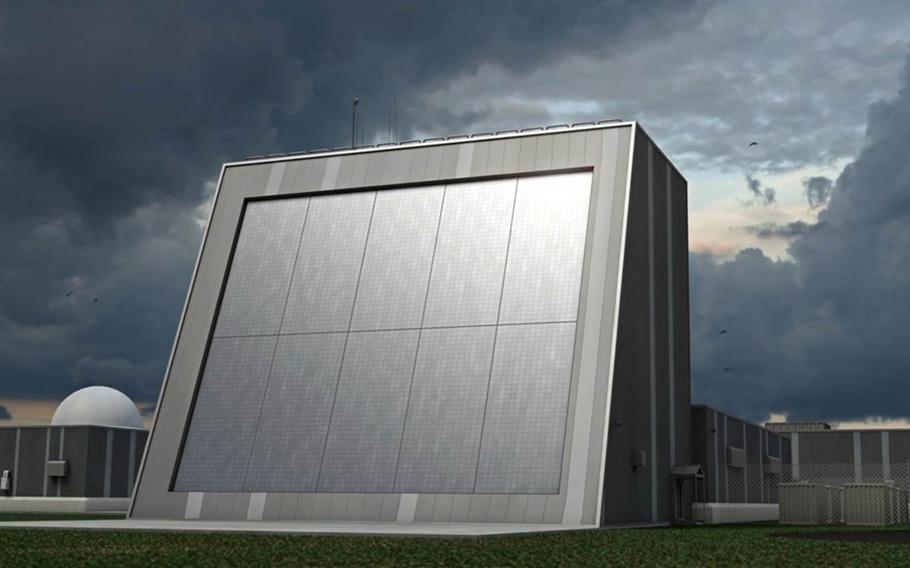
The House version of the fiscal 2022 National Defense Authorization Act provides $75 million to continue development of the Homeland Defense Radar-Hawaii, shown here in an artist’s conceptual rendering. (Missile Defense Agency)
(Tribune News Service) — U.S. Rep. Ed Case said the House passed a defense policy bill that "expresses the sense of Congress" that Hawaii should have discrimination radar coverage against intercontinental ballistic missiles equivalent to Alaska's long-range discrimination radar.
The House version of the fiscal 2022 National Defense Authorization Act provides $75 million to continue development of the beleaguered Homeland Defense Radar-Hawaii and calls on the Missile Defense Agency to request "adequate funding" for the radar in future budget planning.
"The HDR-H is a critical state-of-the-art radar system designed to protect our country and state from ballistic missile threats from countries like North Korea and was strongly supported by our Indo-Pacific military leaders," Case said in a release.
On Thursday the House passed a $778 billion authorization — about $25 billion more than the Biden administration proposed — as part of the fiscal 2022 defense policy bill.
In February 2020 the Hawaii radar, which now is approaching a cost of $2 billion or more due to delays, was postponed by the Pentagon. In two subsequent budget years, no funding was sought amid attention increasingly focused on sophisticated Chinese and Russian ballistic and maneuvering hypersonic and cruise missiles.
As a result, a missile tracking gap persists in the Pacific. While the Sea-Based X-Band Radar now spends more time at sea and Navy destroyers have tremendous capability, “some additional sensor is likely needed for the defense of Hawaii,“ the Center for Strategic and International Studies said.
The $75 million request for the big Hawaii radar, which would have an 85-foot face and likely be located at the Pacific Missile Range Facility on Kauai, keeps the proposal moving ahead at a basic planning level.
Case successfully added an amendment in the bill relating to the inspection of piping and support infrastructure at the Red Hill Bulk Fuel Storage Facility.
"The continued availability and use" of the fuel farm "is a matter of national security," the Hawaii Democrat noted in the amendment language.
But past leaks also "raise significant questions whether the facility is being operated and maintained to the highest standard possible."
"My amendment requires a significantly enhanced inspection standard for Red Hill's pipeline system and other supporting infrastructure and appurtenances," said Case, a member of the House Appropriations Committee.
Case said the bill also directs the Defense Department to identify the architecture and acquisition approach to implement a "360-degree integrated air and missile defense capability to defend the people, infrastructure and territory of Guam from advanced cruise, ballistic and hypersonic missile threats."
The bill provides $6.2 billion — $1.1 billion more than the president's budget request — for the Pacific Deterrence Initiative that represents defense requests to counter China's assertiveness in the Indo-¬Pacific region.
The Defense Department said in late May that its budget "prioritizes the China threat as the department's pacing challenge." Adm. Phil Davidson, former head of U.S. Indo-Pacific Command headquartered on Oahu, had outlined $4.68 billion in required investment in fiscal 2022.
"The most important action the U.S. can take to increase the joint force's lethality" is to introduce 360-degree air defense capability in Guam, which Davidson described as "our most crucial operating location in the Western Pacific."
The assessment also called for a tactical multimission over-the-horizon radar in Palau, a "constellation of space-based radars," enhanced intelligence, surveillance and reconnaissance and "highly survivable precision-strike fires" that can support air and maritime movement from distances greater than 300 miles.
Case said other approved amendments include:
— Hawaii military land leases: Requires an annual report to Congress on progress by the Defense Department to renew each military land lease and easement in Hawaii.
— Marine Corps infrastructure: Requires a report from the Marine Corps identifying what infrastructure is needed to directly support the Corps' realignment in the Indo-Pacific. "This will support efforts to improve the aging infrastructure at Marine Corps Base Hawaii," Case's release said.
— Investigation into lasers used against military aircraft in Hawaii: Requires an official investigation into these incidents and offering means of mitigating the risk to military aircraft and personnel.
— Military presence in Palau: Expresses the sense that Congress is receptive to Palau's request that the United States establish a regular military presence there for defensive purposes.
(c)2021 The Honolulu Star-Advertiser
Visit The Honolulu Star-Advertiser at www.staradvertiser.com
Distributed by Tribune Content Agency, LLC.